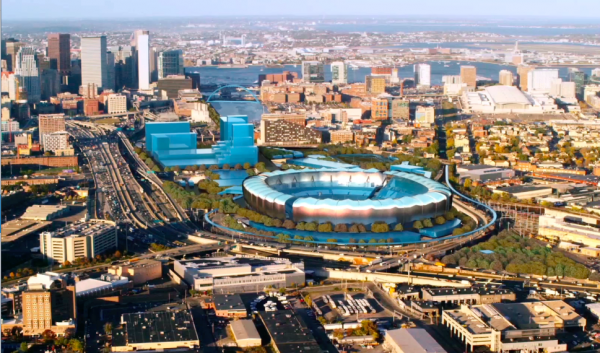January 22, 2015

Boston 2024's rendering of the proposed "Midtown" Olympic Stadium, located at Widett Circle.
Despite assurances from Boston 2024 that the businesses in the 20-acre food production facility at Widett Circle would have a seat at the table in any ongoing Olympic discussions, that was not the case as the bid was unveiled on Wednesday.
“We never had any discussions,” said Marion Kaiser, president of Aquanor Marketing, one of nearly two dozen New Boston Food Market. “Who ever said we were for sale? We’re not. It’d be very convenient if we were.”
The current Olympic plan calls for a 60,000 seat temporary stadium to be built on the site of the New Boston Food Market located at Widett Circle.
Dan O’Connell, president of Boston 2024, said the New Boston Food Market would be relocated to Southie's Marine Industrial Park at expense of Boston 2024, with no jobs lost. He made the remarks in response to an audience question at the first Citizens Advisory Group meeting hosted on Wednesday night at the Boston Convention Center.
Michael Vaughan, the president of Nauset Strategies who represents New Boston Food Market, said the business co-op had never once been approached about any sort of re-location plan.
“We have had no discussions with Boston 2024 about relocation. Until we do, our answer is firm: We love Widett Circle,” Vaughan said on Thursday.
Under Boston 2024’s proposal, the 80-acre stadium site is nestled into Widett Circle, stretching north over city- and state-owned parcels currently used as a tow lot, salt lot, and MBTA transfer station. New Boston Food Market, the only facility under a Widett Circle address, occupies 20 acres. Organizers have also re-named the area as “Midtown” but repeatedly referred to the stadium being sited at Widett Circle.
Vaughan and Kaiser added that repeated references to Widett Circle as a “scar” were hurtful to the business owners and more than 700 employees where the vast majority of the city’s meats, fish, produce and other food stocks are stored and processed.
“We had good meetings back in the fall where we were assured a seat at the table. Reading today’s paper, that seat at the table was put into doubt,” Vaughan said. “We can coexist and we can support the Olympics, we just need a seat at the table.”
Mayor Martin Walsh reached out to Vaughan early this morning and is setting up a meeting with the New Boston Food Market owners in the next few days.
“He’s given us an assurance that this is a priority,” Vaughan said.
Kaiser said that while the New Boston companies, who six months ago were fighting off an abutting proposed trash transfer facility, have not yet lost business because of the Olympics, many owners are holding off making upgrades or renovations to their buildings until the dust settles in two and a half years. “In the meantime, I do think it’s disrespectful to have businesses being treated as if they’re disposable,” Kaiser said.
“We would rather coexist with a stadium rather than a transfer station,” Vaughan said, adding, “A stadium that is fairly sited and permitted with a process that respects the New Boston Food Market and gives them a seat at the table.”
Under the city’s permitting process, the stadium would have to address abutting New Boston Food Market’s concerns surrounding traffic, parking, and urban design before they can go forward with any plans. “I’d expect the city to make Boston 2024 go through a process, recognize any potential impacts, and mitigate them,” Vaughan said.
O’Connell said that if the proposed Midtown/Widett Circle stadium site falls through, Suffolk Downs has been floated as an alternative, “but we have not pursued that at all to date.”
Tags:


